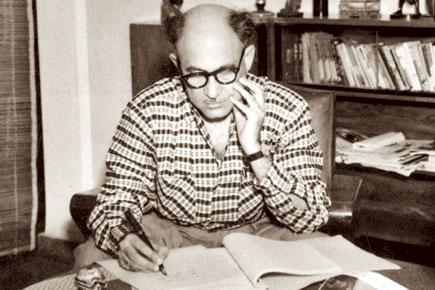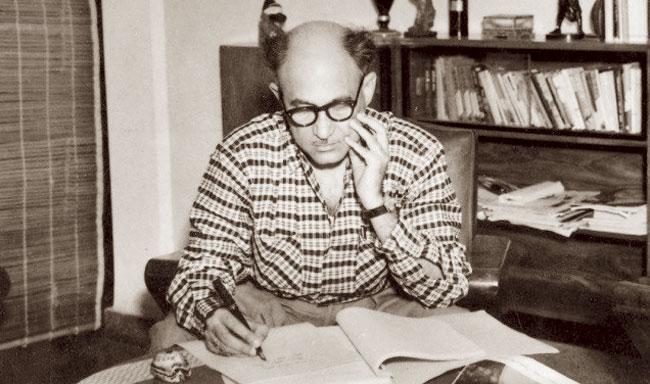This is the birth centenary year of KA Abbas. June 7 was his 100th birth anniversary. Not a peep out of the media for a man who was a pioneering journalist, thinker, filmmaker, screenwriter, playwright and humanist

 This is the birth centenary year of KA Abbas. June 7 was his 100th birth anniversary. Not a peep out of the media for a man who was a pioneering journalist, thinker, filmmaker, screenwriter, playwright and humanist.
This is the birth centenary year of KA Abbas. June 7 was his 100th birth anniversary. Not a peep out of the media for a man who was a pioneering journalist, thinker, filmmaker, screenwriter, playwright and humanist.
Surprisingly, no tributes paid to the great man by Bollywood, considering he discovered and introduced so many actors Amitabh Bachchan (Saat Hindustani) and Shabana Azmi (Faasla) to name just two.
ADVERTISEMENT
There have been commemorative events at Delhi, his birthplace, Panipat and his alma mater Aligarh Muslim University, but Mumbai has more or less forgotten one of its own masters.

Writer Javed Siddiqi, a close friend of K A Abbas, had said that perhaps Abbas did not get his due because people didn’t know how to slot him. Pic/KA Abbas Memorial Trust
It was up to a suburban cultural society called Chaupaal to hold an evening in his memory. For 16 years, this unique organisation has held a theme-based event, one Sunday a month. For those who have attended, Chaupaal puts together a wonderful evening, full of warmth, nostalgia, shared memories, recitals and performances.
In 1998, a group of friends Atul Tiwari, Rajendra Gupta, Shekhar Sen, Chadraprakash Dwivedi, Ashok Banthia and Ashok Bindal decided that such a cultural and literary knowledge-sharing platform was the need of the hour and Chaupaal was established.
Since June 1998, it has been an unbroken tradition, a meeting one Sunday of the month. The events are informal but not unstructured; the themes are diverse and always imaginative. If this city had any sense, it would have many more Chaupaals, before the levels of ignorance in matters social, cultural, artistic and literary reach alarming levels.
From the Chaupaal session on KA Abbas at Andheri’s Bhavans College, it was revealed by convener Atul Tiwari (writer, director, occasional actor) that way back in 1934, Abbas started India’s first student weekly called Aligarh Opinion. When he came to Bombay in 1935, he worked with the Bombay Chronicle and was its film critic.
Writer Javed Siddiqi, a close friend of Abbas, recalled that he held an acerbic pen, prompting filmmaker Himansu Rai to taunt him saying anybody could find fault in others films, if he was such a know-all he should make, or at least write his own films.
Abbas took up the challenge and sold his first script, Naya Sansar, to Rai’s wife, actress and Bombay Talkies co-owner, Devika Rani. The film was set against the backdrop of journalism and a struggle between idealism and compromise (even more acute today); later, when Abbas set up his own banner, he named it Naya Sansar.
After writing such classics as Neecha Nagar (directed by Chetan Anand, the first Indian film that went to the Cannes Film Festival and won the Palme d’Or) and V Shantaram’s Dr Kotnis Ki Amar Kahani (based on his own novel And One Did Not Come Back, about an Indian doctor sent on a mission to China during World War II). In 1945, he directed Dharti Ke Lal, about the Bengal Famine with searing realism, pre-dating other Indian Neo Realistic films by almost a decade.
He was one of the founding members of the Indian People’s Theatre Association (IPTA), wrote many plays and did his first film for IPTA, casting many theatre actors (now legends) such as Balraj and Damyanti Sahani, Sombhu and Tripti Mitra. While he was still at the Bombay Chronicle, he started writing a column called Last Page, which he then continued to write for Blitz and it went on to become the longest-running column in India.
(When he died, he bequeathed the column to P Sainath) As a filmmaker, his work was exemplary and uncompromising films about the struggles of ordinary people, in keeping with his lifelong commitment to the Marxist ideology like Anhonee (one of the earliest films featuring a double role where Nargis played two sisters), Munna, Shaher Aur Sapna, and Saat Hindustani.
It did surprise many that he started writing scripts for Raj Kapoor’s films (with VP Sathe) and formed an association that lasted several years and hit films, from Awara to Bobby. As Siddiqi said in his talk at Chaupaal, perhaps Abbas did not get his due because people didn’t know how to slot him.
Novelists didn’t take him seriously because he was a journalist; he was not taken seriously as a journalist because he was a scriptwriter; the community of Leftists didn’t take him seriously because he worked with Raj Kapoor.
In whatever he chose to do, Abbas was pioneer and a visionary. His work deserves to be acknowledged at least, if not celebrated. It is heartening to know that the Film and Television Producers Guild introduced the K A Abbas Award for Cinema with Social Sensitivity this year; the first award was given to Shahid and presented by Amitabh Bachchan.
Perhaps the biggest tribute the film industry could pay to KA Abbas is to produce at least one film a year, which could merit an award in his name.
Deepa Gahlot is an award-winning film and theatre critic and an arts administrator. You can follow her on twitter @deepagahlot
 Subscribe today by clicking the link and stay updated with the latest news!" Click here!
Subscribe today by clicking the link and stay updated with the latest news!" Click here!







